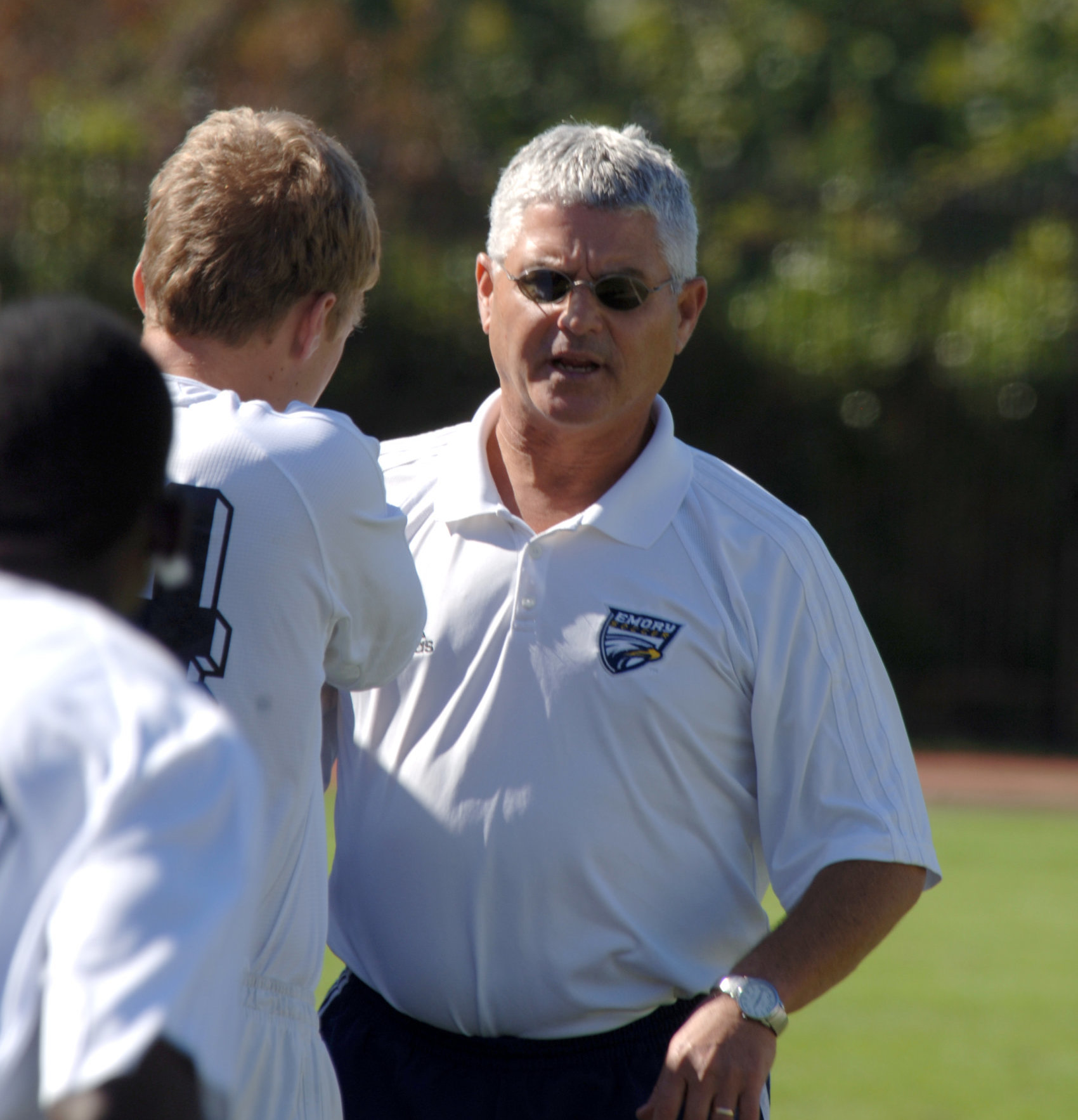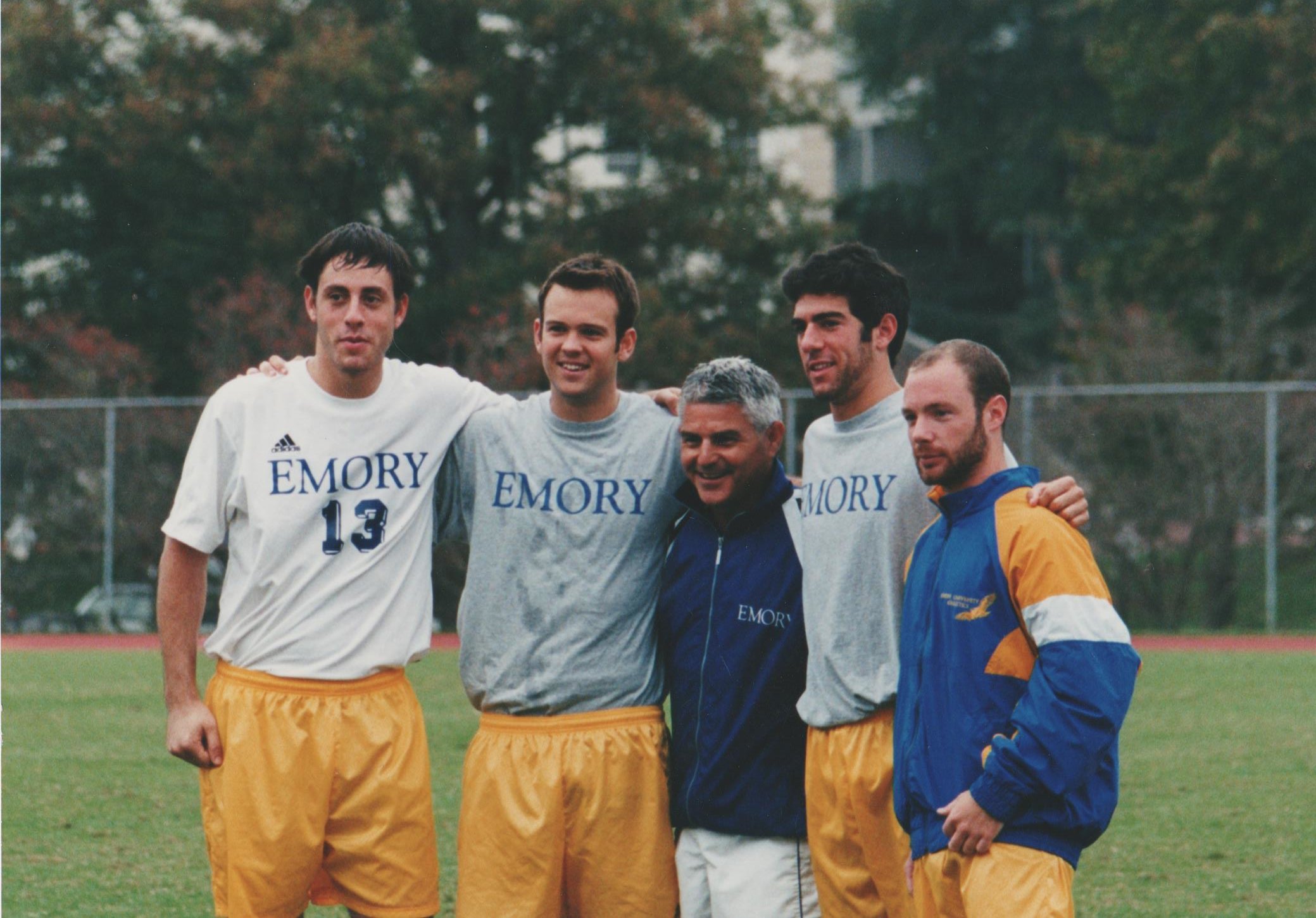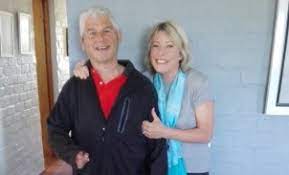My good friend Mike Rubesch is a father, husband, and a successfully retired soccer coach. Unfortunately, Mike is also afflicted by Corticobasal Degeneration, also referred to as Early Onset Dementia.
Mike was born in Los Angeles, CA, in 1957 and played soccer at Erskine College in South Carolina, graduating in 1980. Mike went on to coach soccer at Atlanta’s St. Pius X High School from 1981 – 1984, leading the Boy’s Soccer team to three consecutive Georgia Final Four appearances. From there, Mike moved on to become Assistant Coach at Emory University from 1984 to 1987 and then served as Head Coach from 1988 to 2007. Mike earned numerous awards and accolades, including five UAA Championships and three Metropolitan Life Division III Region Coach of the Year awards.

Mike married his wife Jeanne in 1993, and I met Mike after becoming neighbors in 1994. Mike was an athlete, a coach, a father, a brother, a mentor, and a close friend. Mike had a positive outlook on life and was always able to see the good in any person or situation. I last saw Mike while attending an Emory soccer game in New York City in 2006. Mike and his family moved to South Africa the following year to take a position with the Cape Town Ajax in the Premier League, where he coached from 2007 to 2008. Mike returned to coaching in the United States in 2009 with an Assistant Coaching position with the Coastal Carolina Chanticleers. For the next several years, Mike split his coaching time between Coastal Carolina and his soccer academy in Hermanus, SA.

In 2012, Mike’s daughter Justine explained that he began to exhibit signs of spatial disorientation and other minor cognitive issues. During a morning drive to school with Justine, Mike lost focus and struck a concrete construction barrier, and never appeared to see it. Other signs of disorientation became worse, leading to tumbles off podiums and loss of balance. In addition, Mike sometimes had difficulties instructing students at his soccer academy, and in frustration, he resorted to shouting at his team.
During the 2013 soccer season at Coastal Carolina, Mike had difficulties remembering the names of his players on the field. Soon after, Mike was diagnosed with Corticobasal Degeneration (CBD). Mike returned to his home in Hermanus. In 2014, Mike was required to renew his South African visa, which required a trip back to the United States. When he returned to Hermanus in 2015, his condition had deteriorated: he was confused and entered into a state of deep depression, withdrawing himself from family and friends. Mike was unable to attend Justine’s High School graduation and continued to slide deeper into his own abyss. During 2017, Mike displayed his worst symptoms and behavior toward his family; he became combative and was often unaware of his surroundings while his frustrations overcame him. All the while, his family stayed at his side and supported him as best they could. Justine describes the need to isolate herself from her Dad’s uncontrolled actions by thrusting herself into her school, sports, and the comfort of her close friends.
As the year turned to 2018, Mike’s doctors recommended institutionalized care for him. Mike was not fully aware of the meaning, but his family decided to intervene and take care of Mike at home, on their own. Mike learned to accept his family as his caregivers, and his frustrations and confusion started to ease. Mike has not verbally communicated to his wife and children for several years but responds with a smile or nod if the conditions are right.

Mike’s daughter Justine graduated from college with a degree in theater and has a successful career in marketing and accounting with a Cape Town company. She candidly speaks of her successes and failures in dealing with Mike’s dementia and its impact on her life and the lives of her family. Justine has agreed to join us in telling Mike’s Brain Story, and we look forward to having her become a member of our team.
The following story is told by Mike’s daughter Justine, who we have the pleasure of working with on this and future projects.
“When I think back on my life at the age of 23, I have to often pinch myself to fully grasp what transformational life events I have endured. Humans have this amazing ability to go into what I believe one to define as “survival mode,” or what my mother would refer to as, “getting the …. on with it”.
And so that is what my family did when we received the news in 2013 that my Dad had been diagnosed with corticobasal degeneration, In more simplistic terms, early-onset dementia. We simply got on with it. For years we adapted, coped, struggled, embraced this horrific disease, and watched someone we loved, day in and day out, deteriorate in front of our eyes. Now, a bit older, and a tad wiser, I find myself reliving a lot of the moments and thinking, “did that really happen?”. It seems incomprehensible to envision half of what we went through, what we saw. It was heart-breaking, it was raw and tragic. It was and is our struggle. My Dad will never be able to tell his story. But I can tell mine.
It’s amazing how we humans can immediately tell when something is wrong. It’s this internal knowingness that something is out of balance. I had known for a while that my Dad seemed “off,” but I could not quite define exactly what was wrong. The image of my Dad driving us to school and crashing the car has replayed so many times in my mind. Possibly because it was the defining moment of everything. Before this accident, there were some doubts – which in a way was comforting. Nothing had been confirmed yet, but once he crashed the car on our way to school, everything in my reality changed; this was the moment that set us on the journey of living with dementia. I had never felt so angry, helpless, frustrated, lost, confused, and unsafe in my whole life. If I look back now, it’s quite alarming that I thought that way!
The years that came after that are a bit of a blur. The transitions were gradual and then suddenly rapid. I was young at the time and have always been quite hard-headed and stubborn, standing my ground and taking charge. I’ve always loved being in control, and if I look back now, it’s clear that it stemmed from my Dad’s inability to be in control of his life. I was very intolerant of him in the beginning. I could not accept the weakness. It was easy to be angry at the situation and to respond with complete despondence.
When my father took his last trip to the US and returned back home in 2014, the transition and degression which had taken place in such a short time frame was tragic. He returned home with a look on his face that embodied utter confusion. Still, at this point, I was not ready to accept the narrative. I rejected it for the remainder of my high school years and emersed myself into every aspect of school, from academics to culture and sport.”
After losing touch with Mike in 2006, I recently ran across a Blog Justine wrote back in April 2018 entitled, “Living with Dementia – Acceptance.” I had no idea that my friend Mike had taken this turn. I reached out to Justine, and Mike’s story above is the result. It is tragic that brain and mental health disorders happen in the first place; it’s even more so when it happens to a close friend. My friend Mike is fortunate that his family can provide care for him; not everyone living with CBD has this option.
It is our heartfelt hope that all matters of the mind will be treated with the respect and dignity they deserve. Brain and Mental Health-related issues impact all of us each and every day. All of these disorders are important, and they all deserve a cure. In this light, we ask you to donate to the United Brain Association for my friend Mike’s benefit, for my benefit, and for the benefit of your families, past, present, and future.
Sincerely,
Jay Matey
Executive Director
United Brain Association, Inc.
www.unitedbrainassociation.info
jmatey@unitedbrainassociaiton.org
202.768.8000
Further posts about my friend Mike and his journey with Dementia can be found here:
https://www.emoryathletics.com/sports/msoc/coaches/Rubesch?view=bio
https://gasoccerforum.com/thread/3529/emory-hof-coach-mike-rubesch
You Are Not Alone
For you or a loved one to be diagnosed with a brain or mental health-related illness or disorder is overwhelming, and leads to a quest for support and answers to important questions. UBA has built a safe, caring and compassionate community for you to share your journey, connect with others in similar situations, learn about breakthroughs, and to simply find comfort.

Make a Donation, Make a Difference
We have a close relationship with researchers working on an array of brain and mental health-related issues and disorders. We keep abreast with cutting-edge research projects and fund those with the greatest insight and promise. Please donate generously today; help make a difference for your loved ones, now and in their future.
The United Brain Association – No Mind Left Behind




